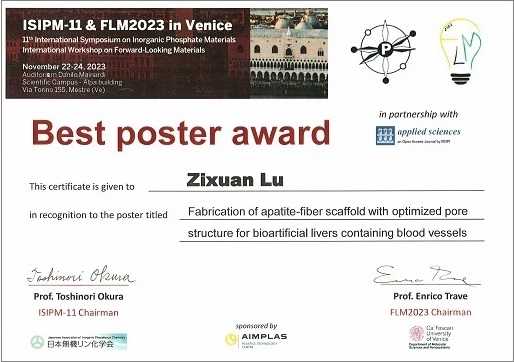[Graduate School of Science and Technology] LU Zixuan wins the Best poster award at the 11th International Symposium on Inorganic Phosphate Materials and International Workshop on Forward-Looking Materials 2023 (ISIPM-11 & FLM2023 in Venice)
Dec. 12, 2023

LU Zixuan (Laboratory of Biomaterials), a second-year master student in the Applied Chemistry Program at Graduate School of Science and Technology (Laboratory of Biomaterial) won the Best poster award at the 11th International Symposium on Inorganic Phosphate Materials and International Workshop on Forward-Looking Materials 2023 (ISIPM-11 & FLM2023 in Venice) on 22–24 November.
The Laboratory of Biomaterials (Professor AIZAWA Mamoru) in the Department of Applied Chemistry of the School of Science and Technology is working on liver regeneration by tissue engineering using hydroxyapatite (HAp), a major inorganic component in living bone. Tissue engineering is a technology that regenerates tissue by combining three elements: cells, growth factors, and scaffold materials. This laboratory works on development of apatite fiber scaffold (AFS) which has excellent biocompatibility as a scaffold material capable of three-dimensional culture, and communication pores through which cells can enter. The final goal of this research is to construct a bioartificial liver containing blood vessels.
In this study, two types of cells (hepatocytes and vascular endothelial cells) were co-cultured in a three-dimensional dynamic environment using AFS and a radial flow bioreactor (RFB) to successfully create a large-scale bioartificial liver containing blood vessels and high liver-specific functions.
In this research, two types of cells (hepatocytes and vascular endothelial cells) were co-cultured in a three-dimensional environment using five types of AFS with different pore shapes, and quantitative assessment of liver function and histological evaluation of blood vessel formation were conducted to elucidate the optimal pore shape for generating enhanced liver-specific functions incorporating blood vessels.
The research findings mentioned above have been acknowledged, earning the Best Poster Award (2 out of 11 awards). The meeting served as a common platform for experts and young researchers from different research fields from the Japan Inorganic Phosphorus Chemistry Association (JAIPC) and the Department of Molecular Sciences and Nanosystems (DSMN) of Ca' Foscari University of Venice to directly discuss novel ideas and projects spanning a broad spectrum of topics. Based on the focus ISIPM-11 and FLM2023 respectively deal with, the joint congress featured specialized sessions dedicated to recent progress in inorganic phosphate materials, as well as novel approaches and strategies for synthesizing and applying advanced materials.
This research was also carried out as one of the research subjects of the research themes contributing to the achievement of SDGs at the Meiji University International Institute for Materials with Life Functions.
≪Japanese version≫
The Laboratory of Biomaterials (Professor AIZAWA Mamoru) in the Department of Applied Chemistry of the School of Science and Technology is working on liver regeneration by tissue engineering using hydroxyapatite (HAp), a major inorganic component in living bone. Tissue engineering is a technology that regenerates tissue by combining three elements: cells, growth factors, and scaffold materials. This laboratory works on development of apatite fiber scaffold (AFS) which has excellent biocompatibility as a scaffold material capable of three-dimensional culture, and communication pores through which cells can enter. The final goal of this research is to construct a bioartificial liver containing blood vessels.
In this study, two types of cells (hepatocytes and vascular endothelial cells) were co-cultured in a three-dimensional dynamic environment using AFS and a radial flow bioreactor (RFB) to successfully create a large-scale bioartificial liver containing blood vessels and high liver-specific functions.
In this research, two types of cells (hepatocytes and vascular endothelial cells) were co-cultured in a three-dimensional environment using five types of AFS with different pore shapes, and quantitative assessment of liver function and histological evaluation of blood vessel formation were conducted to elucidate the optimal pore shape for generating enhanced liver-specific functions incorporating blood vessels.
The research findings mentioned above have been acknowledged, earning the Best Poster Award (2 out of 11 awards). The meeting served as a common platform for experts and young researchers from different research fields from the Japan Inorganic Phosphorus Chemistry Association (JAIPC) and the Department of Molecular Sciences and Nanosystems (DSMN) of Ca' Foscari University of Venice to directly discuss novel ideas and projects spanning a broad spectrum of topics. Based on the focus ISIPM-11 and FLM2023 respectively deal with, the joint congress featured specialized sessions dedicated to recent progress in inorganic phosphate materials, as well as novel approaches and strategies for synthesizing and applying advanced materials.
This research was also carried out as one of the research subjects of the research themes contributing to the achievement of SDGs at the Meiji University International Institute for Materials with Life Functions.
≪Japanese version≫
Related links


